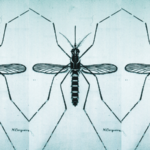The mercurial and hazardous terrain of female friendship is often explored and exposed in crime fiction, especially in domestic noir and psychological thrillers. Why? Because as every woman will confirm, at its best, female friendship is enlightening, supportive, intense and affirming; the high, when female friendship is flourishing, is second only to falling in love. We invest in one another, unreservedly, and expect incredible returns. However, when things turn sour, the results are often catastrophic: blistering, brutal betrayal and pitiless, ruthless revenge abound. My novel, I Invited Her In, investigates what is owed and what is due between friends who once loved each other intensely, but ultimately find themselves capable of dark and devastating deceit.
I, like many novelists, enjoy writing about emotional truths that people recognize, hoping readers will invest at a deeper level, forging an intimacy between the reader and characters. Even if (thank your lucky stars) readers have not been in the same circumstances as the characters, they will have felt some of the emotional range: nearly everyone has been buffeted by revenge, jealousy or betrayal at some point in their lives.
Betrayal leads to a host of complex thoughts and feelings, in both victims and perpetrators. Below are some of my favorite thrillers and domestic noir novels centered around female friendship gone sour; a kaleidoscope of anger, confusion, guilt, shame, and just maybe, love and atonement.
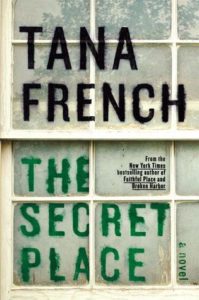
Tana French, The Secret Place
It has been argued that French is one of the most consistently exciting crime novelists working today. The Secret Place is her fifth Dublin Murder Squad book, and it may be her most bold novel yet. A deeply chilling portrait of the ways in which teenage female friendships can overrule any conventional morality. It is set in a girls’ boarding school where a 16-year-old boy was murdered. The so-called “secret place” is a board where the students can anonymously post love letters, secrets, and clues. The question is, which tightly knit group of teenage girls is responsible?

Liane Moriarty, Big Little Lies
Pirriwee Public is a beautiful little beachside primary school where children are taught that ‘sharing is caring.’ Despite that, the annual school Elvis and Audrey Hepburn fancy dress gala night ends with wailing police sirens and one parent dead. Tightly plotted, Moriarty rolls back the veneer of the seemingly perfect lives of the parents at the idyllic school and the readers are plunged into a pit of deceit, scandal and dangerous lies. However, as the quagmire of endless challenges are negotiated—teenage rebellion, blended families, single motherhood, affairs, domestic violence and rape—one thing shines through, a tremendously intense and supportive friendship between three women: Jane, Madeline and Celeste. I love this celebration of friendship. I’m not saying it all ends well, I’m just saying it’s a joy to be part of their community and, as reader, I was.
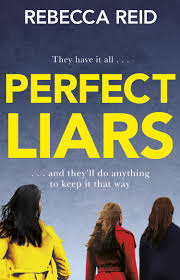
Rebecca Reid, Perfect Liars
If Moriarty’s threesome is too good and bold for you, the antidote is Reid’s trio in Perfect Liars; a dark, witty and frankly cruel debut novel. Sixteen years ago, best friends Nancy, Georgina and Lila did something unspeakable whilst attending an exclusive but stifling British boarding school. Their crime forged an unbreakable bond entirely dependant on silence but now, one of them wants to talk. However, one word and their enviable adult lives will fall apart. Georgia calls a crisis dinner, all three will attend but only two will walk away because murder is easier the second time around. The protagonists are despicable, the victim no better. Whilst this is a sordid glimpse at female friendship when it is foul and evil, the novel simmers with intelligence and tension.
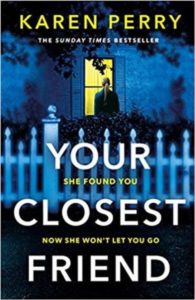
Karen Perry, Your Closest Friend
The Irish word for friend is cara, and Cara is the name Perry chose for one of her two female protagonists in Your Closest Friend. She’s telling us all, from the get go, that friendship is fertile ground for thrills and crimes. Cara’s friendship with Amy is shaped in a moment of profound stress. A terror attack in London means these two women are forced to take refuge together in a room above a shop, while terrorists rampage below. Naturally, an intense and sudden attachment is formed between the two women. This friendship is partially based on their shared experience, but also fed by their own private needs. Amy is rootless and lonely. Her interest in Cara, while seemingly innocent, is anchored by an ominously obsessive need. The closeness she desires is far deeper and more demanding than Cara could ever imagine. Cara, distracted by her own messy personal life, doesn’t see that their friendship is perilous and that Amy, far from being the good Samaritan, is damaged and dangerous. Some friendships peter out, having served their purpose, but Amy will not allow theirs to end. For Amy, a friend is for life, or it that, until death?
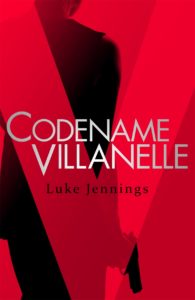
Luke Jennings, Codename Villanelle
Not exactly a look at female friendship, but something close, female obsession. This spy-action thriller follows two fiercely intelligent women who are equally obsessed with each other and go head to head in an epic game of cat and mouse. A tense, murderous duel ensues between wonderfully human, desk-bound MI6 agent Eve Polastri and Villanelle, a psychotic top-of-her-game assassin. Jennings has perhaps created the most twisted female spy villain ever. Villanelle’s beautiful, steely brilliance is all the more compelling because of the shadow she casts over Eve’s light. These co-dependants are fantastically thrilling and enthralling. The novella is intense, forceful, absorbing.
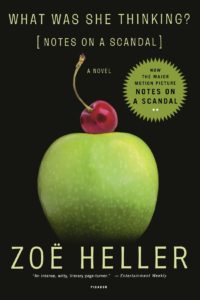
Zoe Heller, Notes on a Scandal
This is tremendous look at the intense and uneven friendship between two school teachers, Barbara and Sheba. Barbara, a repressed middle-aged lesbian, with a pitiful life that entirely centres around her school, has no emotional connections with anyone. Although she narrates, it’s hard to feel sympathy as she exposes herself to be a condescending and often viciously spiteful observer of the people around her. It’s all the more intriguing then, when she strikes up an unlikely friendship with glamourous, intoxicating Sheba, a new teacher at the school who everyone aches to befriend. Initially it seems that the beautiful Sheba is nothing other than generous, welcoming and largesse, but she is soon exposed to be flawed. She’s balancing a dull marriage and a special needs child with her work; she’s not simply the epitome of class and glamour, the near-celestial being that Barbara craves; she is vulnerable, needy, simply moral. Barbara is bitterly disappointed when Sheba embarks on an illicit affair with a pupil. An action Barbara not only judges as illegal and immoral but most importantly, a betrayal. Chaos ensues.
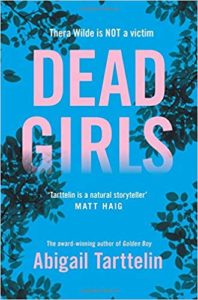
Abigail Tarttelin, Dead Girls
A quiet community is shocked by the murder of an eleven-year-old girl. But Thera, the dead girl’s best friend forever, is more than shocked—she is devastated. Thera, bright and precocious is the one who found Billie’s body after she’s missing for several days. More damaging still, Thera and Billie had been out together the day Billie disappeared and Thera feels responsible for not seeing Billie all the way home. As police swarm the village looking for the killer, fear compels parents to lie to their children and to keep them indoors, but the lies we tell young girls to keep them safe might be the most dangerous thing of all. Thera and Billie have always been interested in ghosts and ghost stories and have practiced with a Ouija Board so Thera decides that this is how she will communicate with the now deceased Billie and find her killer. So she embarks on a fraught and dangerous path. A shocking, poignant, brutal and tender book about a friendship that endures after death.
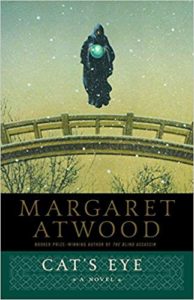
Margaret Atwood, Cat’s Eye
This novel is about the potential toxicity in female friendships; a thorny, provocative but very real issue that authors have often returned to and will continue to do so. Middle-aged Elaine Risley, a painter, returns to Toronto to find herself overwhelmed by her past. Memories of childhood—unbearable betrayals and cruelties—surface relentlessly, forcing her to confront the threat and power of Cordelia, who was once her best friend and has always been her tormentor. Fifty years may have gone by but Elaine is still haunted. The memories may have been buried like toxic waste, but their poison still seeps out into the landscape surrounding. Tense, beautiful, ferocious. It seems the disturbing cruelty of girls knows no bounds.











